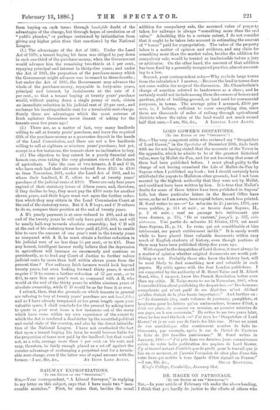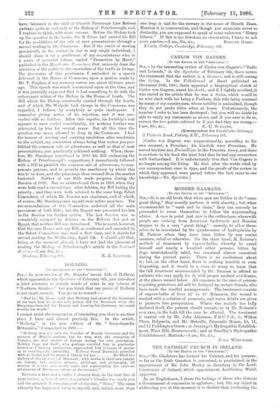DR. MAGEE ON PATRONAGE.
ITo THE EDITOR Or THE " Sexcrrros.1 SIR,—In your article of February 6th under the above heading, I think that you hardly do justice to the efforts of others who have laboured in the field of Church Patronage Law Reform perhaps quite as zealously as the Bishop of Peterborough, and, I venture to think, with more success. Before the Bishop took up the question in the Lords, Sir R. Cross had carried his Bill for the prohibition of the sale of next presentations through a second reading in the Commons. But if the credit of moving persistently in the matter be due to any single individual, I should claim it for a gentleman of my acquaintance who, in a series of powerful letters, signed "Promotion by Merit," published in the Manchester Examiner, first seriously drew the attention of the public to the enormities of the traffic in livings. The discoveries of this gentleman I embodied in a speech delivered in the House of Commons, upon a motion made by Mr. T. Hughes, if my memory serves me, about thirteen years ago. This speech was much commented upon at the time, and it was generally supposed that it had something to do with the subsequent action of the Bishop in the House of Lords. The Bill which the Bishop eventually carried through the Lords, and of which Mr. Walpole took charge in the Commons, was regarded, I believe, by everybody as quite inadequate. I remember giving notice of its rejection, and it was pro- ceeded with no further. After this repulse, his lordship's zeal appears to have cooled considerably, for nothing further was attempted by him for several years. But all this time the question was never allowed to drop in the Commons. I had the honour of moving and carrying resolution after resolution on the subject, my contention always being that unless you pro- hibited the common sale of advowsons, as well as that of next presentations, you practically achieved nothing. When, there- fore, Mr. Stanhope introduced in 1883 his Bill embracing the Bishop of Peterborough's suggestions, I immediately followed with a Bill to prohibit the common sale of advowsons, to com- pensate patrons, and to provide the machinery by which this was to be done, and the patronage thus rescued from the market bestowed. Neither of our Bills made progress during the Session of 1883. But we reintroduced them in 1884, when they were both read a second time after debates, my Bill having the priority ; and they were both referred to the same large Select Committee, of which Mr. Forster was chairman, and of which, of course, Mr. Stanhope and myself were active members. The recommendations of this Committee endorsed all the main provisions of both Bills ; but the Report was presented too late in the Session for further action. The last Session was so completely occupied by debates on the Reform Act and on Egypt, that neither Bill was introduced. The moment, however, that the new House met, my Bill, as confirmed and amended by the Select Committee, was read a first time, and it stands for second reading for Wednesday, April 7th. I should add that, being at the moment abroad, I have not had the pleasure of reading the Bishop of Peterborough's article in the Xatimal Review.—I am, Sir, &c ,



































 Previous page
Previous page